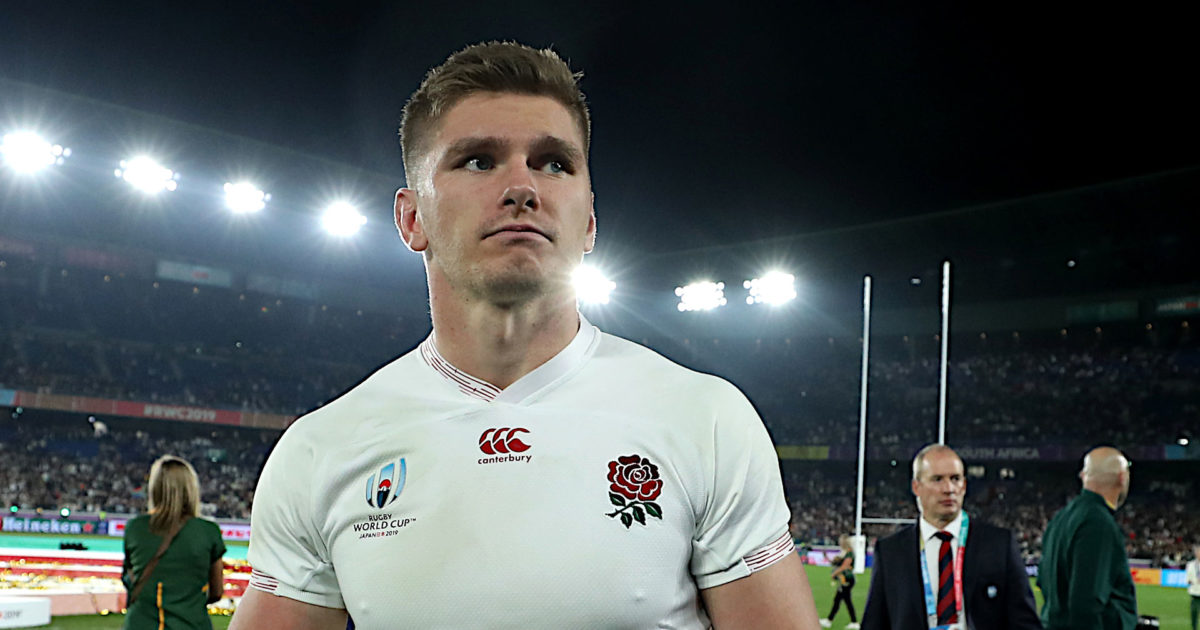Written judgment reveals what Owen Farrell said in his defence at his hearing

The RFU have published the ten-page short-form written judgment regarding the five-match ban handed down to England captain Owen Farrell following his red-carded tackle last weekend on Wasps teenager Charlie Atkinson. There has been much commentary following Tuesday night’s disciplinary hearing over how the initially proposed ten-match entry point punishment was reduced to five when off-field character mitigations were taken into account.
That reduction has left Farrell free to resume playing from October 5, making him available to feature in the Champions Cup final should defending champions Saracens qualify and then link up with the England squad ahead of their October 25 season resumption when they face the Barbarians at Twickenham, a game that will be followed by five Test matches.
Speaking in his defence at the hearing that was held virtually, the RFU’s written judgment – which was published on Friday – details how Farrell told the panel he was 28 years of age, had 201 Premiership games for Saracens, 83 England caps, 4 Tests for the British and Irish Lions and was also the current England captain.
Explaining the mechanics of his high tackle on Atkinson which resulted in his 61st minute Allianz Park red card, Farrell said he kicked the ball and intended to chase the Wasps youngster and tackle him from the side. He claimed he could see Atkinson was a bit hesitant and he thought he could get to him, adding how he was aiming for his arm below the shoulder in the hope of simultaneously possibly dislodging the ball.
“I was expecting to hit him between his shoulder and arm,” said Farrell to the panel, explaining that he had lunged at the middle of Atkinson’s arm in the hope of dislodging the ball as he tackled and as he did so his head went to the right-hand side of Atkinson.
He faced a 10-game ban before off-field mitigation factors were taken into accounthttps://t.co/lz6AUdyenw
— RugbyPass (@RugbyPass) September 8, 2020
Farrell admitted he did not appreciate Atkinson’s slight change of direction given the pace he was running and accepted he did not control his contact with his opponent as he should have done. The judgment continued: “He [Farrell] did not set out to tackle high. He was unaware that Atkinson dipped slightly as he checked. On contact, he knew that he had gone over the shoulder and that the contact had gone wrong.
“He apologised on the field. After he was dismissed, he waited at the side of the pitch for Atkinson, apologised to him and again in the clubhouse. He was gutted that he had caused the injury. He had not stopped thinking about it and was very disappointed in himself. He never ever thought he would get a red card as he had much pride and energy in setting high standards for himself. He said what he had done set a bad example.”
To help convince the panel to apply the full mitigation to the punishment they intended to give to Farrell, the England skipper’s representative Richard Smith referred to how Paul Gabrillagues of France had successfully appealed the six-week ban handed down to him last year prior to the World Cup and got it halved to three.
Considering the evidence, the panel deemed the Farrell tackle to be reckless. “This was a badly executed tackle, committed at high speed which resulted in the removal of Atkinson from the field of play.”
The judgment then outlined how they reached the decision to apply a 50 per cent reduction to the initially suggested ten-game ban. “The panel considered Smith’s submissions relating to mitigation very carefully and determined that having taken into account paragraphs 71-75 of the Gabrillagues appeal decision and our other findings, a 50 per cent reduction was justified.
“Again it is not just a matter of arithmetics and a tick box exercise. The player’s disciplinary record is not perfect. However, the only matter on his record is a two-week ban from four-and-a-half years ago when he was 24.
“The regulations do not refer to a time when a previous sanction may be disregarded for mitigation purposes. There is an element of discretion. The panel concluded that such is the weight of other mitigating factors, including acknowledgement of culpability, obvious and genuine remorse and considerable (and exceptional) evidence as to the player’s good character that the two-week ban from four-and-a-half years ago should not prevent the player from receiving the maximum reduction by way of mitigation available.”
The full ten-page short-form written judgment is available here.
This outcome has ignited a firestorm ? https://t.co/zp9SuYVeo6
— RugbyPass (@RugbyPass) September 9, 2020





























